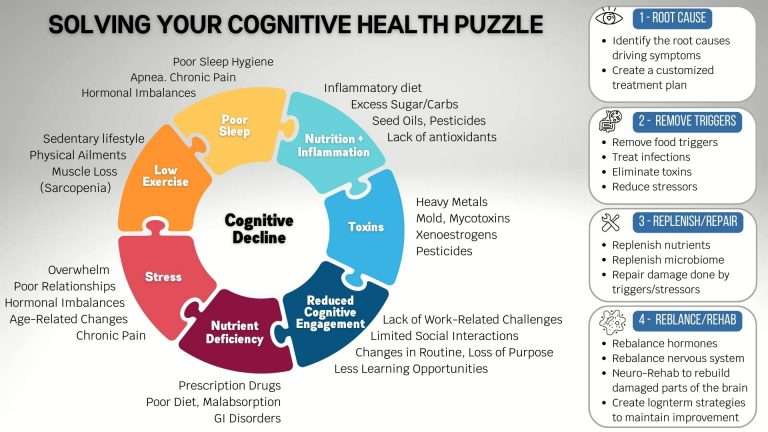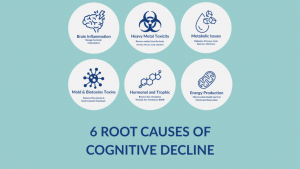Blood Sugar and Brain Health: The Connection Most Doctors Miss
Your brain consumes 20% of your body’s glucose, making it extremely vulnerable to blood sugar problems. At The Carroll Institute, we’ve discovered that blood sugar dysregulation is one of the most common yet overlooked causes of memory loss and cognitive decline in our Sarasota patients.
Most doctors focus on managing diabetes without understanding its devastating impact on brain function. As the only ReCODE certified functional neurology clinic in the area, we identify and treat the blood sugar problems that destroy memory years before diabetes is diagnosed.
The Hidden Epidemic: Pre-Diabetes Brain Damage
Blood sugar problems damage your brain long before you’re diagnosed with diabetes.
Pre-Diabetes Statistics:
- 88 million Americans have pre-diabetes
- 84% don’t know they have it
- Brain damage begins during pre-diabetic stage
- Standard medical tests miss early blood sugar problems
Early Brain Damage Signs:
- Memory problems and brain fog
- Difficulty concentrating after meals
- Afternoon energy crashes
- Mood swings and irritability
- Sleep disturbances
The tragedy: doctors dismiss these symptoms as “stress” or “aging” while blood sugar silently destroys brain cells.

How Blood Sugar Problems Destroy Memory
Multiple mechanisms link blood sugar dysregulation to cognitive decline.
Direct Brain Cell Damage:
High glucose levels create toxic compounds called Advanced Glycation End Products (AGEs). These compounds accumulate in brain tissue, causing inflammation and cell death. Brain cells cannot regenerate like other body cells.
Vascular Damage:
Elevated blood sugar damages the tiny blood vessels that supply the brain. Reduced blood flow starves brain cells of oxygen and nutrients. Memory centers like the hippocampus are especially vulnerable.
Insulin Resistance in the Brain:
The brain develops its own insulin resistance, preventing glucose uptake by brain cells. Brain cells literally starve despite high blood sugar levels. This process is sometimes called “Type 3 Diabetes.”
Chronic Inflammation:
Blood sugar spikes trigger inflammatory responses throughout the body, including the brain. Chronic inflammation destroys neural connections and prevents new memory formation.
Neurotransmitter Disruption:
Blood sugar instability affects brain chemical production. Memory and learning neurotransmitters decline. Mood regulation chemicals become imbalanced.
The Alzheimer's-Diabetes Connection
Research reveals the shocking link between blood sugar and dementia.
Diabetes Doubles Alzheimer’s Risk:
People with diabetes have twice the risk of developing Alzheimer’s disease. The risk increases with longer duration of diabetes and poorer blood sugar control.
Pre-Diabetes Increases Dementia Risk:
Even pre-diabetes significantly increases cognitive decline risk. Brain damage begins years before diabetes diagnosis.
Insulin Resistance Predicts Cognitive Decline:
Insulin resistance in the body predicts brain insulin resistance. This leads to progressive memory loss and eventual dementia.
Blood Sugar Variability Matters:
Large swings in blood sugar cause more brain damage than consistently elevated levels. Many people have dangerous blood sugar swings without knowing it.
Why Standard Blood Sugar Tests Miss Brain Damage
Traditional diabetes screening fails to detect brain-damaging blood sugar problems.
Fasting Glucose Limitations:
Standard fasting glucose tests only show blood sugar after 8-12 hours without food. They miss dangerous spikes that occur after meals.
A1C Inadequacy:
Hemoglobin A1C shows average blood sugar over 3 months but doesn’t reveal harmful fluctuations. Normal A1C can coexist with brain-damaging glucose spikes.
Glucose Tolerance Test Problems:
Two-hour glucose tolerance tests miss delayed blood sugar responses. Some people have normal 2-hour results but dangerous 3-4 hour elevations.
Insulin Testing Neglect:
Most doctors don’t test insulin levels. High insulin with normal glucose indicates insulin resistance and brain damage risk.
The Carroll Institute's Advanced Blood Sugar Assessment
We use comprehensive testing that reveals brain-damaging blood sugar problems.
Continuous Glucose Monitoring:
Patients wear monitors that track blood sugar every few minutes for days or weeks. This reveals dangerous patterns that standard tests miss completely.
Comprehensive Metabolic Panel:
- Fasting glucose and insulin levels
- Hemoglobin A1C for long-term averages
- C-peptide to assess pancreatic function
- Advanced lipid panels showing metabolic dysfunction
Inflammatory Markers:
Blood tests for inflammation caused by blood sugar problems. Chronic inflammation accelerates brain damage and cognitive decline.
Functional Assessment:
Correlation of blood sugar patterns with cognitive symptoms. Many patients see direct relationships between glucose spikes and brain fog.
Real Patient Cases: Blood Sugar and Memory Loss

Case Study: Patricia M., Age 63, Sarasota
Presenting symptoms: Progressive memory loss, afternoon brain fog, diagnosed with “early dementia”
Testing revealed: Normal fasting glucose but dangerous post-meal spikes to 200+ mg/dL, high insulin levels indicating severe insulin resistance
Treatment protocol: Metabolic optimization with specific dietary changes, targeted supplementation, and custom cognitive exercises
Results: Memory problems resolved, energy stable throughout day, MoCA score improved 6 points

Case Study: James K., Age 59, Lakewood Ranch
Presenting symptoms: Difficulty concentrating, word-finding problems, fatigue after meals
Testing revealed: Pre-diabetes with severe blood sugar variability, brain inflammation markers elevated
Treatment protocol: Blood sugar stabilization, anti-inflammatory interventions, neurological rehabilitation
Results: Concentration improved dramatically, returned to demanding job, prevented progression to diabetes
Our Metabolic Optimization Protocol
Effective blood sugar treatment requires comprehensive intervention

Phase 1: Stabilization
Immediate blood sugar stabilization through targeted dietary changes. Elimination of foods that cause dangerous spikes. Meal timing optimization for stable glucose levels.
Phase 2: Insulin Sensitivity Restoration
Natural interventions to improve insulin function. Specific nutrients that enhance glucose uptake by cells. Exercise protocols designed for metabolic improvement.
Phase 3: Inflammation Reduction
Anti-inflammatory approaches to heal blood sugar damage. Brain-specific inflammation reduction protocols. Antioxidant support to repair cellular damage.
Phase 4: Neurological Rehabilitation
Custom cognitive exercises to rebuild brain pathways damaged by blood sugar problems. The Carroll Institute is the only clinic in Sarasota creating personalized cognitive rehabilitation for metabolic brain damage.
Preventing Blood Sugar Brain Damage
Protecting your brain from glucose-related damage:
Dietary Strategies:
- Eliminate refined sugars and processed carbohydrates
- Focus on low-glycemic foods that don’t spike blood sugar
- Eat protein and healthy fats with every meal
- Time meals to maintain stable glucose levels
Lifestyle Modifications:
- Regular exercise improves insulin sensitivity
- Stress management reduces cortisol and blood sugar
- Adequate sleep is essential for glucose regulation
- Weight management improves metabolic function
Monitoring and Testing:
- Regular comprehensive metabolic assessment
- Continuous glucose monitoring for high-risk individuals
- Early intervention when problems are detected
- Professional guidance for optimal protocols
The Metabolic-Cognitive Connection
Blood sugar optimization often produces dramatic cognitive improvements:
Immediate Benefits:
- Improved mental clarity and focus
- Stable energy throughout the day
- Better mood and emotional regulation
- Enhanced sleep quality
Long-term Protection:
- Reduced Alzheimer’s and dementia risk
- Maintained cognitive function with aging
- Protection against vascular brain damage
- Overall brain health optimization
The earlier blood sugar problems are identified and treated, the more complete the cognitive recovery.
Why This Matters for Your Family
Blood sugar problems affect cognitive health in ways most families don’t understand.
Hidden Damage:
Many people have dangerous blood sugar patterns without obvious symptoms. Brain damage occurs silently over years before memory problems become apparent.
Reversible Condition:
Unlike many causes of cognitive decline, blood sugar problems are completely reversible with proper intervention. Early treatment can prevent permanent brain damage.
Family Impact:
Blood sugar problems often run in families. Identifying and treating one family member can prevent cognitive decline in others.
Cost-Effective Prevention:
Metabolic optimization costs far less than managing diabetes complications or dementia care. Prevention is always more effective than treatment.
Concerned that blood sugar problems might be affecting your memory and cognitive function? Schedule a free discovery call to learn about our comprehensive metabolic assessment and proven optimization protocols.
Your memory problems might have a treatable metabolic cause. Don’t let blood sugar silently destroy your brain.
Dr. Garland Glenn leads the only ReCODE certified functional neurology clinic in the Sarasota area, with extensive experience in metabolic optimization and cognitive decline reversal. He has helped hundreds of patients restore their memory by identifying and treating blood sugar problems that traditional doctors miss at The Carroll Institute.

Dr. Garland Glenn, DC, PhD, IFM, AFMC
Founder & Clinical Director, The Carroll Institute — Sarasota, FL
Dr. Garland Glenn is a board-certified chiropractic physician and functional medicine practitioner specializing in cognitive health, neurodegeneration, and root-cause medicine. Certified as an AFMC (Advanced Functional Medicine Clinician) and Institute for Functional Medicine (IFM) trained, he has also completed over 500 hours of advanced training in Functional Neurology under Dr. Ted Carrick, founder of the Carrick Institute.
At The Carroll Institute, Dr. Glenn leads Sarasota’s only ReCODE-certified Functional Neurology program, helping patients reverse or prevent cognitive decline through the Bredesen ReCODE Protocol, neuroplasticity exercises, and personalized functional medicine care.
Learn more about his background and approach at About Dr. Garland Glenn.
– schedule now –
free discovery call
To help you get started, we offer a free 20-minute Discovery Phone Consultation. During this call, you will be able to talk with one of our Certified Brain Health Coaches about what going on with you or your loved one and find out if we can help. Please review our FAQs prior to scheduling your free call. We look forward to talking with you soon and helping you Save Your Brain.
(yes, it’s totally free!)
ReCODE® is a registered program developed by Dr. Dale Bredesen and licensed through Apollo Health. Dr. Garland Glenn is a certified ReCODE practitioner.



